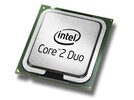Intel Core 2 Duo P8400 vs Intel Core 2 Duo T6600
Intel Core 2 Duo P8400
► remove from comparison
Der Intel Core 2 Duo P8400 Dual-Core Prozessor bietet zwei Prozessorkerne mit einem gemeinsamen Level 2 Cache von 3 MB. Im Vergleich zu den stärkeren Modellen bietet, der P8400 zwar nur die Hälfte an Level 2 Cache, jedoch bleibt dadurch der Stromverbrauch mit maximal 25 Watt auch geringer. Die Architektur des Prozessors basiert auf den Penryn Kern und wird in 45nm gefertigt.
Der P8400 ist sehr ähnlich zu der OEM Version Core 2 Duo P7550, welcher später auf den Markt kam.
Für Multimediaanwendungen und anspruchslose Spiele, sollte die Performance des Intel Core 2 Duo P8400 ausreichen. Im Vergleich zu AMD sollte die Performance auf Niveau der schnellsten Turion II Ultra mit 2.4 - 2.6 GHz liegen. Anspruchsvolle Spielefans sollten jedoch eher zu höher getakteten Core 2 Duo CPUs greifen (>2.5 GHz).
Der Penryn (Montevina Update) Kern bietet 2 Integer Units, 1 Floating Point Unit, 1 Load Unit und 1 Store Unit in einer 14-stufigen Pipeline. Mit der Wide Dynamic Execution Technologie kann der Kern bis zu vier volle Instruktionen gleichzeitig ausführen.
Dank Dynamic Acceleration (später Turbo Modus genannt), kann sich ein Kern um eine Stufe übertakten, wenn der zweite im Idle Modus (Leerlauf) ist.
Das integrierte Enhanced Speedstep kann die Taktfrequenz des Prozessors dynamisch an die Leistungsanforderungen anpassen. Dadurch läuft die CPU ohne Last nur mit 800 MHz.
Der Core 2 Duo P8400 passt in den Socket P (mit 479 Pins):
Socket P / Micro Flip-Chip Pin Grid Array (Micro-FCPGA) requires 479-pin surface mount Zero Insertion Force (ZIF) socket (mPGA479M socket) or Micro Flip-Chip Ball Grid Array (Micro-FCBGA) for surface mount (479-ball)
Intel Core 2 Duo T6600
► remove from comparisonDie Intel Core 2 Duo T6600 Dual-Core CPU ist ein Mittelklasse Dual-Core Prozessor für Notebooks. Die Architektur des Prozessors basiert auf den Penryn Kern und wird in 45nm gefertigt. Im Vergleich zu stärkeren T-Prozessoren bietet der T6600 keine Virtualisierungsfunktionen (Virtualization Technology VT-x) und nur 2 MB Level 2 Cache (Topmodelle bis zu 6 MB). Der Stromverbrauch ist jedoch auch mit max. 35 Watt spezifiziert (TDP).
Durch die mittelmäßige Taktfrequenz und den kleinen Level 2 Cache, kann die CPU bei modernen und anspruchsvollen Spielen durchaus limitieren (z.B. große Multiplayerschlachten bei Supreme Commander). Für die mittelmäßig anspruchsvolle (nicht professionelle) Anwendungen wie Office, Entry-Level Videoschnitt, Bildbearbeitung, Internet und casual Gaming sollte die Leistung jedoch ausreichen.
Der Penryn (Montevina Update) Kern bietet 2 Integer Units, 1 Floating Point Unit, 1 Load Unit und 1 Store Unit in einer 14-stufigen Pipeline. Mit der Wide Dynamic Execution Technologie kann der Kern bis zu vier volle Instruktionen gleichzeitig ausführen.
Dank Dynamic Acceleration (später Turbo Modus genannt), kann sich ein Kern um eine Stufe übertakten, wenn der zweite im Idle Modus (Leerlauf) ist.
Das integrierte Enhanced Speedstep kann die Taktfrequenz des Prozessors dynamisch an die Leistungsanforderungen anpassen. Dadurch läuft die CPU ohne Last nur mit 800 MHz.
Der Core 2 Duo T6600 passt in den Socket P (PGA478)
| Model | Intel Core 2 Duo P8400 | Intel Core 2 Duo T6600 |
| Codename | Penryn | Penryn |
| Series | Intel Core 2 Duo | Intel Core 2 Duo |
| Serie: Core 2 Duo Penryn | ||
| Clock | 2260 MHz | 2200 MHz |
| FSB | 1066 | 800 |
| L1 Cache | 128 KB | 128 KB |
| L2 Cache | 3 MB | 2 MB |
| Cores / Threads | 2 / 2 | 2 / 2 |
| TDP | 25 Watt | 35 Watt |
| Transistors | 410 Million | 410 Million |
| Technology | 45 nm | 45 nm |
| Voltage | 1.05-1.15 V | 1.00-1.25V V |
| Die Size | 107 mm2 | 107 mm2 |
| max. Temp. | 105 °C | 105 °C |
| Socket | Socket P | PGA478 |
| Features | SSE4.1, Virtualization Technology, Execute Disable Bit, Enhanced Speedstep, Ehnaced Halt State (C1E), 64 Bit, Trusted Execution Technology | Intel 64, Enhanced Speedstep, Execute Disable Bit, SSE4.1 |
| Architecture | x86 | x86 |
| $209 U.S. | ||
| Announced | ||
| Manufacturer | ark.intel.com | ark.intel.com |
Benchmarks
Average Benchmarks Intel Core 2 Duo P8400 → 100% n=11
Average Benchmarks Intel Core 2 Duo T6600 → 90% n=11
* Smaller numbers mean a higher performance
1 This benchmark is not used for the average calculation













